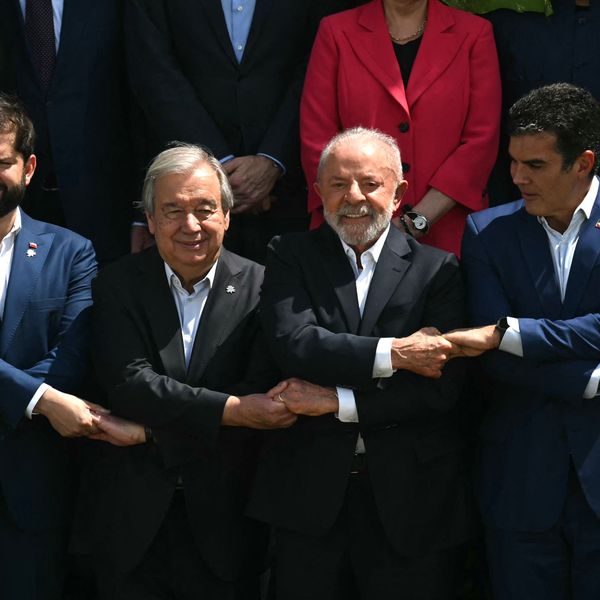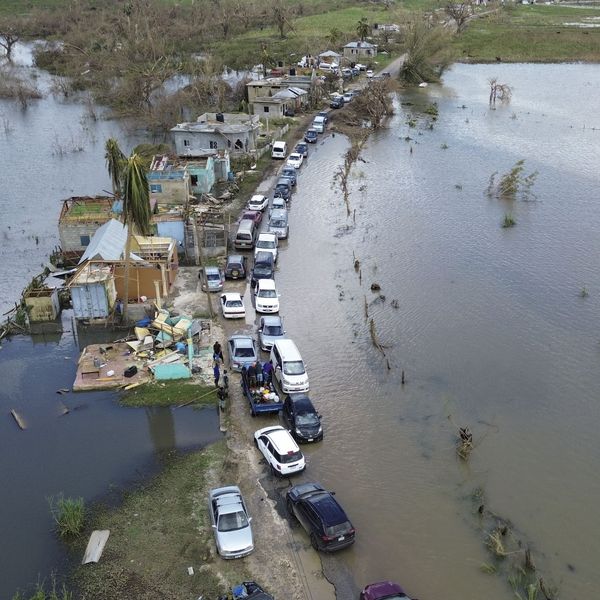Pinpricks Derail Action on Climate
Of course, it's possible that the incredibly warm, barbecues-in-March weather we've recently enjoyed is just a fluke and has nothing whatsoever to do with climate change.
It's also possible that if your 2-year-old falls into a swimming pool, he might manage to thrash his way to the side without you having to jump in to save him. On the other hand, jumping in might seem like a sensible precaution.
While obvious with the child in the pool, sensible precaution oddly seems to elude us when it comes to climate change. The vast preponderance of scientific evidence - prepared over the past two decades by thousands of scientists around the world under the authority of the UN Intergovernmental Panel on Climate Change (IPCC) - points to potentially catastrophic global warming and the role of humans in contributing to it.
Yet we allow pinpricks in the side of this vast body of science to derail global action.
The latest pinprick was "climategate" - hacked emails allegedly showing that climate researchers at a British university manipulated climate data to bolster the global warming case. That prompted an international flurry of "gotcha" commentaries from high-profile media skeptics.
There was considerably less attention last week after a British parliamentary inquiry into climategate announced it found no evidence of manipulated data and no evidence to challenge the "scientific consensus" that global warming is induced by human activities.
Discredited or not, climategate accomplished what the anonymous hackers apparently intended - to create a fog of uncertainty around the science.
The fog even manages to obscure the role of the immensely powerful oil and gas lobby, which quietly keeps climate skepticism alive by funding a legion of climate-denial front groups.
According to a report last month by Greenpeace, the wealthy, ultra-conservative Koch family, owners of oil conglomerate Koch Industries, has funnelled nearly $50 million since 1997 to groups denying climate change.
The fog generated has, among other things, enabled Stephen Harper - a climate change denier until becoming Prime Minister - to get away with essentially doing nothing on the climate front.
Last month's federal budget confirmed this trend. According to the Alberta-based Pembina Institute, the U.S. now spends 18 times more per capita on renewable energy than Canada does.
This inaction makes no sense if we simply consider the probabilities. The IPCC estimates that there's perhaps a 10 per cent chance that temperatures will not rise enough to cause worry.
So that leaves a 90 per cent chance that we should worry. Even if the IPCC were off by a factor of five and the chances of a benign outcome increased from 10 to 50 per cent, does it make sense to do nothing?
We might face a serious conundrum if tackling the problem required us to do something really awful, like exterminating all the world's bunnies or chopping down all the evergreens.
But reducing greenhouse gas emissions is something we should do anyway, in order to cut pollution and save limited energy resources. If it turns out to be unnecessary, we'll still be better off.
It would be like jumping into the pool to save your child, discovering he knows how to swim, and then realizing you needed a dip anyway.
On the other hand, the skeptics seems to think you should stay in your deck chair - after all, there's a 10 per cent chance your child is going to be just fine.
An Urgent Message From Our Co-Founder
Dear Common Dreams reader, The U.S. is on a fast track to authoritarianism like nothing I've ever seen. Meanwhile, corporate news outlets are utterly capitulating to Trump, twisting their coverage to avoid drawing his ire while lining up to stuff cash in his pockets. That's why I believe that Common Dreams is doing the best and most consequential reporting that we've ever done. Our small but mighty team is a progressive reporting powerhouse, covering the news every day that the corporate media never will. Our mission has always been simple: To inform. To inspire. And to ignite change for the common good. Now here's the key piece that I want all our readers to understand: None of this would be possible without your financial support. That's not just some fundraising cliche. It's the absolute and literal truth. We don't accept corporate advertising and never will. We don't have a paywall because we don't think people should be blocked from critical news based on their ability to pay. Everything we do is funded by the donations of readers like you. Will you donate now to help power the nonprofit, independent reporting of Common Dreams? Thank you for being a vital member of our community. Together, we can keep independent journalism alive when it’s needed most. - Craig Brown, Co-founder |
Of course, it's possible that the incredibly warm, barbecues-in-March weather we've recently enjoyed is just a fluke and has nothing whatsoever to do with climate change.
It's also possible that if your 2-year-old falls into a swimming pool, he might manage to thrash his way to the side without you having to jump in to save him. On the other hand, jumping in might seem like a sensible precaution.
While obvious with the child in the pool, sensible precaution oddly seems to elude us when it comes to climate change. The vast preponderance of scientific evidence - prepared over the past two decades by thousands of scientists around the world under the authority of the UN Intergovernmental Panel on Climate Change (IPCC) - points to potentially catastrophic global warming and the role of humans in contributing to it.
Yet we allow pinpricks in the side of this vast body of science to derail global action.
The latest pinprick was "climategate" - hacked emails allegedly showing that climate researchers at a British university manipulated climate data to bolster the global warming case. That prompted an international flurry of "gotcha" commentaries from high-profile media skeptics.
There was considerably less attention last week after a British parliamentary inquiry into climategate announced it found no evidence of manipulated data and no evidence to challenge the "scientific consensus" that global warming is induced by human activities.
Discredited or not, climategate accomplished what the anonymous hackers apparently intended - to create a fog of uncertainty around the science.
The fog even manages to obscure the role of the immensely powerful oil and gas lobby, which quietly keeps climate skepticism alive by funding a legion of climate-denial front groups.
According to a report last month by Greenpeace, the wealthy, ultra-conservative Koch family, owners of oil conglomerate Koch Industries, has funnelled nearly $50 million since 1997 to groups denying climate change.
The fog generated has, among other things, enabled Stephen Harper - a climate change denier until becoming Prime Minister - to get away with essentially doing nothing on the climate front.
Last month's federal budget confirmed this trend. According to the Alberta-based Pembina Institute, the U.S. now spends 18 times more per capita on renewable energy than Canada does.
This inaction makes no sense if we simply consider the probabilities. The IPCC estimates that there's perhaps a 10 per cent chance that temperatures will not rise enough to cause worry.
So that leaves a 90 per cent chance that we should worry. Even if the IPCC were off by a factor of five and the chances of a benign outcome increased from 10 to 50 per cent, does it make sense to do nothing?
We might face a serious conundrum if tackling the problem required us to do something really awful, like exterminating all the world's bunnies or chopping down all the evergreens.
But reducing greenhouse gas emissions is something we should do anyway, in order to cut pollution and save limited energy resources. If it turns out to be unnecessary, we'll still be better off.
It would be like jumping into the pool to save your child, discovering he knows how to swim, and then realizing you needed a dip anyway.
On the other hand, the skeptics seems to think you should stay in your deck chair - after all, there's a 10 per cent chance your child is going to be just fine.
Of course, it's possible that the incredibly warm, barbecues-in-March weather we've recently enjoyed is just a fluke and has nothing whatsoever to do with climate change.
It's also possible that if your 2-year-old falls into a swimming pool, he might manage to thrash his way to the side without you having to jump in to save him. On the other hand, jumping in might seem like a sensible precaution.
While obvious with the child in the pool, sensible precaution oddly seems to elude us when it comes to climate change. The vast preponderance of scientific evidence - prepared over the past two decades by thousands of scientists around the world under the authority of the UN Intergovernmental Panel on Climate Change (IPCC) - points to potentially catastrophic global warming and the role of humans in contributing to it.
Yet we allow pinpricks in the side of this vast body of science to derail global action.
The latest pinprick was "climategate" - hacked emails allegedly showing that climate researchers at a British university manipulated climate data to bolster the global warming case. That prompted an international flurry of "gotcha" commentaries from high-profile media skeptics.
There was considerably less attention last week after a British parliamentary inquiry into climategate announced it found no evidence of manipulated data and no evidence to challenge the "scientific consensus" that global warming is induced by human activities.
Discredited or not, climategate accomplished what the anonymous hackers apparently intended - to create a fog of uncertainty around the science.
The fog even manages to obscure the role of the immensely powerful oil and gas lobby, which quietly keeps climate skepticism alive by funding a legion of climate-denial front groups.
According to a report last month by Greenpeace, the wealthy, ultra-conservative Koch family, owners of oil conglomerate Koch Industries, has funnelled nearly $50 million since 1997 to groups denying climate change.
The fog generated has, among other things, enabled Stephen Harper - a climate change denier until becoming Prime Minister - to get away with essentially doing nothing on the climate front.
Last month's federal budget confirmed this trend. According to the Alberta-based Pembina Institute, the U.S. now spends 18 times more per capita on renewable energy than Canada does.
This inaction makes no sense if we simply consider the probabilities. The IPCC estimates that there's perhaps a 10 per cent chance that temperatures will not rise enough to cause worry.
So that leaves a 90 per cent chance that we should worry. Even if the IPCC were off by a factor of five and the chances of a benign outcome increased from 10 to 50 per cent, does it make sense to do nothing?
We might face a serious conundrum if tackling the problem required us to do something really awful, like exterminating all the world's bunnies or chopping down all the evergreens.
But reducing greenhouse gas emissions is something we should do anyway, in order to cut pollution and save limited energy resources. If it turns out to be unnecessary, we'll still be better off.
It would be like jumping into the pool to save your child, discovering he knows how to swim, and then realizing you needed a dip anyway.
On the other hand, the skeptics seems to think you should stay in your deck chair - after all, there's a 10 per cent chance your child is going to be just fine.

